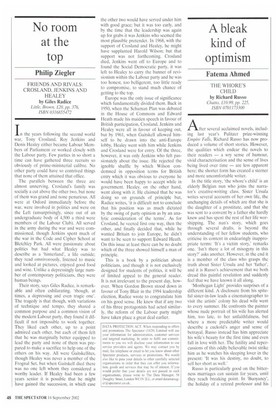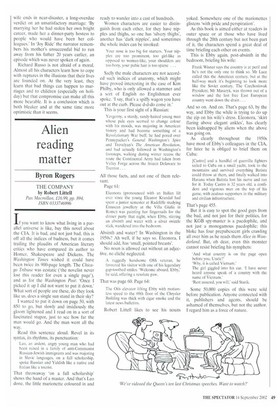A bleak kind of optimism
Fatema Ahmed
THE WHORE'S CHILD by Richard Russo Chatto, ┬Ż10.99, pp. 225, ISBN 0701173300 After several acclaimed novels, including last year's Pulitzer prize-winning Empire Falls, Richard Russo has now produced a volume of short stories. However, the qualities which endear the novels to their readers ŌĆö a wry sense of humour, vivid characterisation and the sense of lives being lived over time ŌĆö are less apparent here; the shorter form has created a sterner and more uncomfortable writer.
In the title story, 'the whore's child' is an elderly Belgian nun who joins the narrator's creative-writing class. Sister Ursula writes several accounts of her own life, the unchanging details of which are that she is the daughter of a prostitute, and that she was sent to a convent by a father she hardly knew and has spent the rest of her life worshipping. The nun's story, which goes through several drafts, is beyond the understanding of her fellow students, who criticise its content in endearingly inappropriate terms: 'It's a victim story,' remarks one. 'Isn't there a lot of misogyny in this story?' asks another. However, in the end it is a member of the class who grasps the truth about Sister Ursula and her 'father', and it is Russo's achievement that we both dread this painful revelation and suddenly feel that we have known it all along.
'Monhegan Light' provides surprises of a different kind. A disclosure from his spiteful sister-in-law leads a cinematographer to visit the artists' colony his dead wife went to every summer. He confronts the painter whose nude portrait of his wife has alerted him, too late, to her unfaithfulness, but where a more predictable writer would describe a cuckold's anger and sense of betrayal, Russo instead has him appreciate his wife's beauty for the first time and even fall in love with her. The futility and repercussions of this oddly believable twist strike him as he watches his sleeping lover in the present: 'It was his destiny, no doubt, to sell her short as well.'
Russo is particularly good on the bitterness marriages can sustain for years, until they reach breaking point. In 'Buoyancy', the holiday of a retired professor and his wife ends in near-disaster, a long-overdue verdict on an unsatisfactory marriage: 'By marrying her he had stolen her own bright career, made her a dinner-party hostess to people who would have been her colleagues.' In 'Joy Ride' the narrator remembers his mother's unsuccessful bid to run away from his father 20 years earlier, an episode which was never spoken of again.
Richard Russo is not afraid of a moral. Almost all his characters learn how to cope with ruptures in the illusions that their lives are founded on. At the very least, they learn that bad things can happen to marriages and to children (especially on holiday) but that compromise can make all this more bearable. It is a conclusion which is both bleaker and at the same time more optimistic than it seems.











































































 Previous page
Previous page